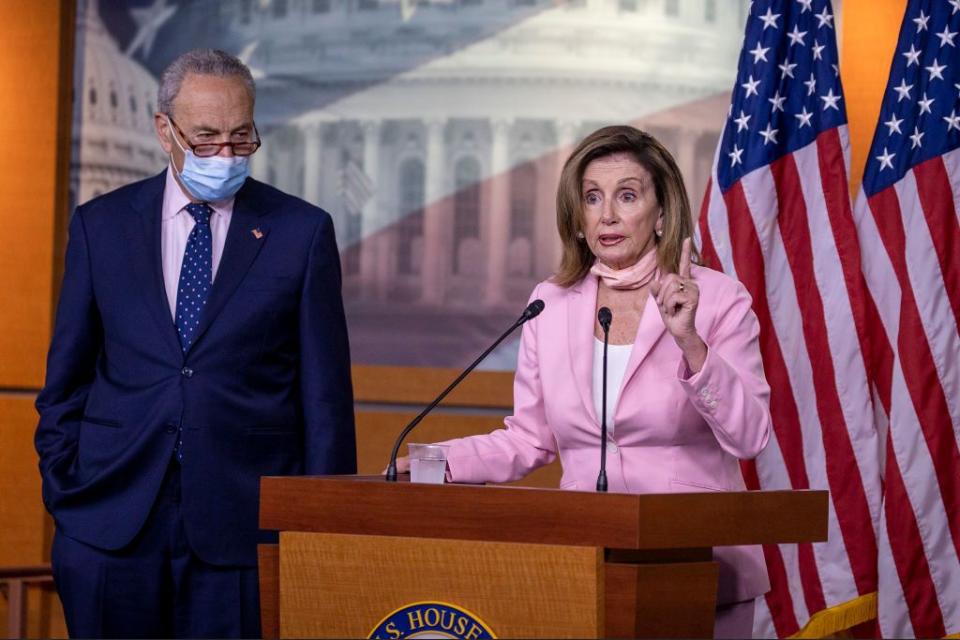Democrats Can Play the Interim Relief Game, Too

(Bloomberg Opinion) -- What’s the next step for House Democrats? Senate Republicans have finally agreed internally on their opening bid for the next pandemic economic relief and stimulus bill, but there’s zero chance that the parties can resolve their differences before two imminent deadlines pass: The expanded unemployment insurance payments put in place by bipartisan legislation in March and an eviction ban for public housing will end this week.
Republicans have floated the idea of an interim bill while they negotiate the big package, and Democrats have shot that idea down. That made sense while Republicans couldn’t even come up with a proposal.
But that’s no longer the case. Democrats can still make the case politically that President Donald Trump, Senate Majority Leader Mitch McConnell, and the Republicans are responsible for the delay — after all, the House of Representatives passed the Democrats’ $3 trillion relief bill over two months ago and Republicans were playing “wait and see” until this week — but now that negotiations have begun, some media commentators will be tempted to say that both sides are equally at fault or that “Congress,” rather than the Republican Party, is dysfunctional.
So it makes some sense for House Democrats to quickly pass their own interim bill. The whole idea of such a measure is to prevent temporary harm without making a final deal less likely. That’s why the stopgap plan that Republicans suggested was an obvious nonstarter as far as the Democrats were concerned. Republicans wanted to shrink unemployment insurance now, and also to enact a liability shield to protect businesses from coronavirus-related lawsuits, which Democrats oppose. In other words, the Republican “interim” bill would give them most of what they want in a final bill and leave the Democrats hoping to get the things they favor in future, surely futile, negotiations.
Democrats, who actually want a successful final bill, should counter with a reasonable offer: A one-month extension of the eviction ban and of the full, $600-per-week expanded unemployment benefit. That would still accept significant damage to the economy, since state and local governments desperately need the assistance that the House measure would provide but that Trump and the Republicans oppose. It would also do nothing to accelerate the next round of direct-assistance checks that both parties now support, or help schools prepare for the fall, or provide aid to states to prepare for the challenges of administering elections during a pandemic, or any of the other things Democrats want. All that, along with the possibility of a liability shield and the best levels for unemployment insurance going forward, would be the subject of the serious negotiations that will begin now. But at least people at risk would be protected, as would the larger economy, from the effects of suddenly slashing payments received, and therefore money spent, by millions of the unemployed.
And the House could easily take up and pass that kind of interim extension quickly, while it’s not clear that Republicans have even a simple majority of their own senators in favor of their interim bill, given that many Senate Republicans are against any further unemployment insurance supplements (and it’s possible that some of the 12 Republican senators in contested races might not want to go on record voting to slash those benefits).
It’s unlikely that the Senate would take up any such House bill, but not impossible. In the unlikely event that Republicans went along, there’d be no harm to the Democrats’ bargaining position. At worst, Democrats would get a minor talking point for now.
To be clear: The real action is in the main negotiations, and it’s still not clear how the parties can find common ground given the $2 trillion-plus gap between the amount they propose to spend and the vast policy differences in their approaches. Blame for the damage during negotiations will be forgotten once a deal is reached, or certainly if talks break down. But still, proposing and passing a reasonable House interim bill this week would give Democrats something more to talk about, at no cost to them. Their old (and accurate, at the time!) talking point about Republicans not showing up to negotiate is expiring. They might as well generate a new one.
This column does not necessarily reflect the opinion of the editorial board or Bloomberg LP and its owners.
Jonathan Bernstein is a Bloomberg Opinion columnist covering politics and policy. He taught political science at the University of Texas at San Antonio and DePauw University and wrote A Plain Blog About Politics.
For more articles like this, please visit us at bloomberg.com/opinion
Subscribe now to stay ahead with the most trusted business news source.
©2020 Bloomberg L.P.

 Yahoo Finance
Yahoo Finance 